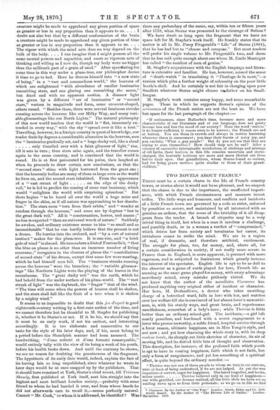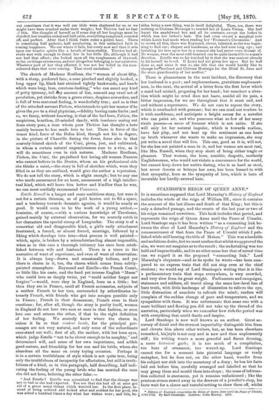TWO NOVELS ABOUT FRANCE.*
TIIERE must be a certain charm in the life of French country
towns, or stories about it would not be so pleasant, and we suspect that the charm is due to the importance, the unaffected import- ance, with which French circumstances and manners invest trifles. The little ways and humours, and conflicts and incidents of a little French town are governed by. a code so strict, enforced by penalties so severe, and maintained by all interested with so genuine an ardour, that the sense of the triviality of it all disap- pears from the reader. A breach of etiquette may be a very trivial thing in itself, but when in a man it involves a challenge, and possibly death, or in a woman a verdict of compromised," which drives her from society and terminates her career, its trivialness ceases to strike the mind. We are in a region of real, if dramatic, and therefore artificial, excitement. The struggle for place, too, for money, and, above all, for a certain consideration in society, if not really more severe in France than in England, is more apparent, is pursued with more eagerness, and is subjected to limitations which greatly increase the interest of the spectator. English life is apt to be as dull to the observer as a game of cards played for love, French life as amusing as the same game played for money, with every advantage mercilessly seized, every mistake pitilessly visited. We do
not know that the author of the novellette Unawares has produced anything very original either of incident or character. Her hero, M. Deshoulieres, a doctor who takes unwilling
charge of a betrothed ward, falls in love with her, and watches over her welfare till she is convinced of her absent lover's unworthi- ness, is, with his stately ways, and great brain, and superhuman unselfishness, somewhat of a lady's hero ; while Ttuirise is little better than an ordinary school-girl. The incidents,—a girl left nearly penniless, and burdened with a secret engagement to a lover who proves unworthy, a noble friend, hospital-service through
a fever season, ultimate happiness, are in Miss Yonge's style, and not new ; and yet how charming the whole story is, with its deep couleur locale, its sharply-cut little sketches of character, its air of moving life, and its dotted little bits of thought and observation. This description, for instance, of the profound faith which youth is apt to have in coming happiness, faith which is not faith, but only a form of sanguineness, and yet has something of a spiritual effect, is quite beyond the ordinary novelist :— " There3o was not one of these people to whom we turn in our sorrows, sure at least of being understood, if we are not helped. As yet she was impatient of sorrow, eager for happiness. She hated tragedies, sad books, minor music Therese believed only in one kind of happiness— our wills gratified, our dreams realized, all the little idols we have set up smiling down up3n us from their pedestals : as we go on in life we find • Unawares. By the Author of "One Year." London: Smith, Elder, and Co. 1870. Estelle Russell. By the Author of "The Private Lite et taaltitio." London: Macmillan. 1870.
out sometimes that it was well our idols were shattered for us, or we might have been crushed under their weight ; but Therese had no fear of this. She thought of herself as if some day all her longings must be satisfied, her troubles ended and laid aside, everythingcompleted, rounded off, and perfect. After that I think there came a golden haze. There is something half pathetic, half comforting, in this unlimited faith in coming happiness. We see where it fails, but every now and then it acts upon our wearier spirits like a breath of immortality. Therese had al- ready met with enough to daunt her in her little life, although it had not had that effect ; she looked upon all the ronghnesses of the road, so far, as things extraneous, and not altogether belonging to her existence. Whatever part of her they affected, it was not her belief in the rose- coloured days that were coming. That stood unshaken."
The sketch of Madame Roulleau, the "woman of about fifty, with a sharp, puckered face, a nose pinched and slightly hooked, a long upper lip, black hair strained tightly backwards, and hands which were long, lean, covetous-looking," who can enact any kind of petty tyranny, tell iny amount of lies, commit any cruel act of peculation, yet shrinks from a grave crime, despises cowardice, and is full of true maternal feeling, is wonderfully true ; and so is that of the attached servant Pichon, who intends to quit her master if he gives the pas to a rival physician,—fidelity having caste limits ; and so, we fancy, without knowing, is that of the bad hero, Fabien, the suspicious, heartless, ill-minded dandy, with insolence oozing out
from every pore, a man whom poor Therese has thought a hero mainly because he has made love to her. There is force of the truest kind, force of the Defoe kind, though not his in degree, in the picture of Charville during the fever, force also in that scarcely-hinted sketch of the Cure, pious, just, and cultivated, in whom a certain natural ungraciousness rose to a vice, as it will do sometimes even in rich natures. Madame Roulleau, Pichon, the Cure, the prejudiced but loving old woman Nannon
who cannot believe in the Doctor, whom on his professional side she thinks a saint,—the story is full of sketches which, were they filled in as they are outlined, would give the author a reputation. We do not tell the story, which is slight enough ; but to any one who needs amusement for an hour, amusement of a high intellec- tual kind, which will leave him better and kindlier than he was, we can most cordially recommend Unawares.
Estelle Russell is a longer and more ambitious story, but were it not for a certain thinness, as of gold beaten out to fill a space, and a tendency towards domestic agonies, it would be nearly as good. It would seem to be the work of a young author,— feminine, of course,—with a curious knowledge of Thoulouse, gained mainly by external observation, for we scarcely catch in her characters the special stamp of Languedoc. The story is of a somewhat old and disagreeable kind, a girl's early attachment frustrated, a forced, or almost forced, marriage, followed by a liking which develops into love—that process is well painted— which, again, is broken by a misunderstanding almost impossible, when as in this case a thorough intimacy has once been estab- lished between wife and husband. There is a trace in the
narrative of want of experience, and even of want of observation. It is always long - drawn and occasionally tedious, and yet there is charm in it, too, the charm which comes from subtly- painted atmosphere. Raymond and Estelle—the French Count, so little like his caste, and the hard yet intense English "Meess" who could love so deeply twice, yet "could neither forget nor forgive "—would, were they in England, bore us a little ; but then they are in France, amid all French accessories, subjects of a mother French to her toes, surrounded by subordinates in-
tensely French, with friends who get into scrapes possible only in France ; French in their demeanour, French even in their emotions ; for, after all, though the story is purity itself, women in England do not love two men at once in that fashion, or even love one and esteem the other, if that be the right definition of her feeling. We scarcely know where the charm is, unless it lie in that couleur locale, for the principal per- sonages are not very natural, and only some of the subordinate ones stand out well ; first of all, the mother, with her keen eyes, which judge Estelle "not to be clever enough to be naughty," and determined will, and sense of her own importance, and selfish good-nature, and friendship for her son and his bride, whom she abandons all the same on every trying occasion. Perhaps it is in a certain truthfulness of style which is not quite true, being only the truthfulness of incapacity for affectation, but still is truth- fulness of a kind, as in this paragraph, half describing, half indi-
cating the feeling of the young bride who has married the man she did not love, believing the other false:—
" And Estelle ? Estelle was astonished to find that the change was not so bad as she bad expected. You see that she had all at once got rid of a great many things which worried her. In the first place, in- stead of being ordered and looked after and scolded for her good, she
was asked a hundred times a day what her wishes were ; and this, be-
sides being a new thing, was in itself delightful Then, too, there was nothing at Château Montaiga to remind her of Louis Vivian. She had burnt the sandalwood box and all its contents, except the locket in which was her father's hair. She had even erased a marginal note which Louis had made when reading her Froissart's Chronicles.' And to crown all this, there was Raymond, clever, talented, as she was begin- ning to find out ; elegant and handsome, as she had seen long ago ; and lavishing his love upon her in a manner she had never even dreamt of. No woman, even the most cold-hearted, can be quite insensible to a man's devotion. Estelle was so far touched by it that she was content already to let herself be loved. If Louis had not given her up— But lie had done so, and since it was so, she felt that she would hardly like to change heAushand and Château Montaign for the Hotel St. Jean and the stern guardianship of her mother."
There is pleasantness in the next incident, the discovery that her husband is a poet ; and unpleasantness, gratuitous unpleasant- ness, in the next, the arrival of a letter from the first lover which a maid had mislaid, proposing for her hand ; but somehow a situa- tion which might be cruel does not leave, amidst all its pain, a bitter impression, for we see throughout that it must end, and end without a repentance. We do not care to repeat the story, which is overloaded with persons ; but we can send our readers to it with confidence, and anticipate a bright career for a novelist who can paint air, and who possesses what so few of her many rivals possess—a sense of humour which is not satire. If she will only let her natural impulse, which is towards realism, have fair play, and not heat up the sentiment as one heats up broth whenever she wants to make an impression, she may yet write a novel that will live. This one, good as it is, will not, for she has not painted a man in it, and her women are most real, like Mrs. Russell, when they atop short of being either tragic or pleasant. That woman, the keen, sensible, despotic, motherly Englishwoman, who would not violate a convenance for the world, but cannot keep down her native daring, who is as hard as steel, but never deserts or betrays her own, has been limned in with that sympathy, keen as the sympathy of love, which is born of incurable but hardly-avowed hate.































 Previous page
Previous page